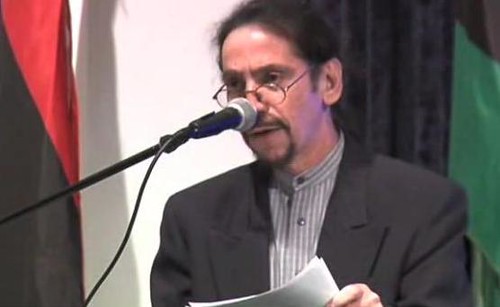
Last week's strongest radio moment would be a discussion of the new National Defense Authorization Act. The discussion took place on Black Agenda Radio, hosted by Glen Ford (above) and Nellie Bailey (airs each Monday at 4:00 pm EST on the Progressive Radio Network) and was presented as a conversation between Ford and journalist Chris Hedges.

Hedges is the author of many books including the just out in paperback Death of the Liberal Class which we selected as one of the ten most important books of the last ten years and a top ten book of the year in 2010 and in 2011 in Martha and Shirley's survey of The Common Ills community. He is also suing President Barack Obama and Secretary of Defense Leon Panetta over the NDAA.
Glen Ford: Veteran journalist Chris Hedges fears that anyone can be thrown into prison without trial under the preventive detention bill signed into law by President Obama so Hedges has sued the president. We asked Hedges how he decided to take on the White House.
Chris Hedges: It actually wasn't my idea. Carl Mayer who has been involved in lawsuits to defend the assaults against civil liberties including the ACLU lawsuit against the FISA reform act -- of which I am one of the plantiffs -- came to me and said, "Look, under this legislation, someone like you could be, potentially because of the nebulous language, charged. You've had direct, personal contact with groups that the state has defined as terrorist organizations. There are no provisions in this legislation to exempt journalists. Would you be willing to be a plantiff?" And I said yes.
Glen Ford: Particularly ominous in this legislation is the use of the term "substantial support," not material support.
Chris Hedges: Right.
Glen Ford: And most people think they understand what material support is --
Chris Hedges: Right.
Glen Ford: -- giving money, passing a gun, something, but substantial support?
Chris Hedges: Right and it could be substantial support for something called associated forces so it leaves open such a broad interpretation that there is no protection for someone like me under this law or I think for ultimately any kind of dissident because there has been a clear effort on the part of the security state to try and tar the Occupy Movement as a movement that's an enemy of American democracy. When you look at the list or the criteria by which the Attorney General's office can investigate people for terrorism, tossing in a couple of obstructionist tactics by the Occupy Movement isn't much of a stretch. I mean, people who are missing fingers on one hand, people who store over seven days of food and provisions, people who have weather proof ammunition. I mean, they're going to have to round up my entire family in rural parts of Maine.
Glen Ford: That's their profile of the potential terrorist.
Chris Hedges: Yeah, as 'worthy of investigation.' We know that there are at this point probably tens of millions of Americans who, because of the FISA reform act, whose e-mails, home messages, all of which are being monitored by the government
Glen Ford: In terms of substantial support, that could be interpreted as speech, giving aid and comfort to someone that they declare is the enemy.
Chris Hedges: Yeah, the way the law is written is, when you read it really closely, really terrifying because it's the whim of the security and surveillance state whoever they want to go after they can pretty much do so under this piece of legislation and then, of course, the way they do it is to use the military to carry out extraordinary rendition on American city streets. And I think to listen to the Obama White House, you know Obama assured in his signing statement that he would not use this legislation to target American citizens? Well [US Senator] Dianne Feinstein proposed inserting into this legislation a clear statement that American citizens would be exempted from it and this was rejected by both the Democractic Party and the Obama White House. They had an opportunity to do it and they didn't. And we know from leaks out of [US Senator] Carl Levin's office that the difficulty that the Obama White House had with the bill was not over the denial of due process but the fact that the executive branch wanted to abrogate for itself the right to decide who, what American citizens would be subject to arrest and detention without access to a lawyer or courts by the military and who would be given exemptions. It was a debate about the prerogatives of the executive branch, it was never a debate about due process or the rule of law.
Glen Ford: Now if we don't have due process, do we have the rule of law?
Chris Hedges: Well if you don't have due process, you don't have the rule of law.
Glen Ford: Are you optimistic?
Chris Hedges: I don't have a lot of faith in the Supreme Court. We saw the case of Jose Padilla. They used to call him the sort-of missing hijacker. He was a US citizen held for three and a half years in a military brig without access to a lawyer or due process. It was challenged, went up to the Supreme Court and, before the Supreme Court took up the case, he was transferred to a civilian court and the Supreme Court said they wouldn't rule on it because it was moot. I mean, they sort of passed it. But given the composition of this particular Supreme Court, I wouldn't say I'm optomistic but I still say we have to try.
Glen Ford: Apologists for Obama say, 'Well this law is nothing new. President Bush claimed the right to detain anyone based on his own criteria and without charges. And that this is nothing new. But it is something new when you codify it into law with the benediction of the Congress.
Chris Hedges: They're right only in this sense: Under the 2001 Authorization to Use Military Force Act, they already were doing a lot of this stuff -- including, of course, targeting American citizens for assassinations. Barack Obama serving as judge, jury and executioner for Anwar al-Awlaki, the cleric who was murdered in Yemen. But I think that most legal scholars saw that as a fairly radical interpretation of that piece of legislation. This [NDAA] essentially legalizes, overturns 200 years -- over 200 years -- of law to permit the armed forces or the military to carry out domestic policing. And I think the other important point about this legislation is that the 2001 act was tied to groups who were directly related to al Qaeda. This now permits this kind of war against a multiplicity of groups, many of which didn't even exist when 9-11 happened -- groups in Yemen, groups in Somolia. It's a way of sort of cementing into place the permanent war psychosis. And remember that these people can be picked up by the military, held without charges, without trial, without access to an attorney, in the language of the bill, until the end of hostilities. Well, you know, when is that? This is an endless war. The 2001 act was bad enough but, you know, at this point to pass a piece of legislation like this which goes into effect in March is catastrophic assault against what's left of civil liberties and our anaemic democracy.
Glen Ford: If this bill had moved through Congress when Bush was president, would you have expected a hailstorm of protest?
Chris Hedges: The Democratic Party is very good at expressing moral outrage against George Bush or Republicans but doing absolutely nothing to counter those activities. So yeah, you would have had the Democratic Party and the liberal establishment speaking out against it and expressing deep disgust and distaste for these measures yet at the same time I think what these people do and what they say is very different.
Again, Black Agenda Radio is a weekly program hosted by Glen Ford (above) and Nellie Bailey (airs each Monday at 4:00 pm EST on the Progressive Radio Network and cross-posted to Black Agenda Report -- usually on Tuesdays.)
